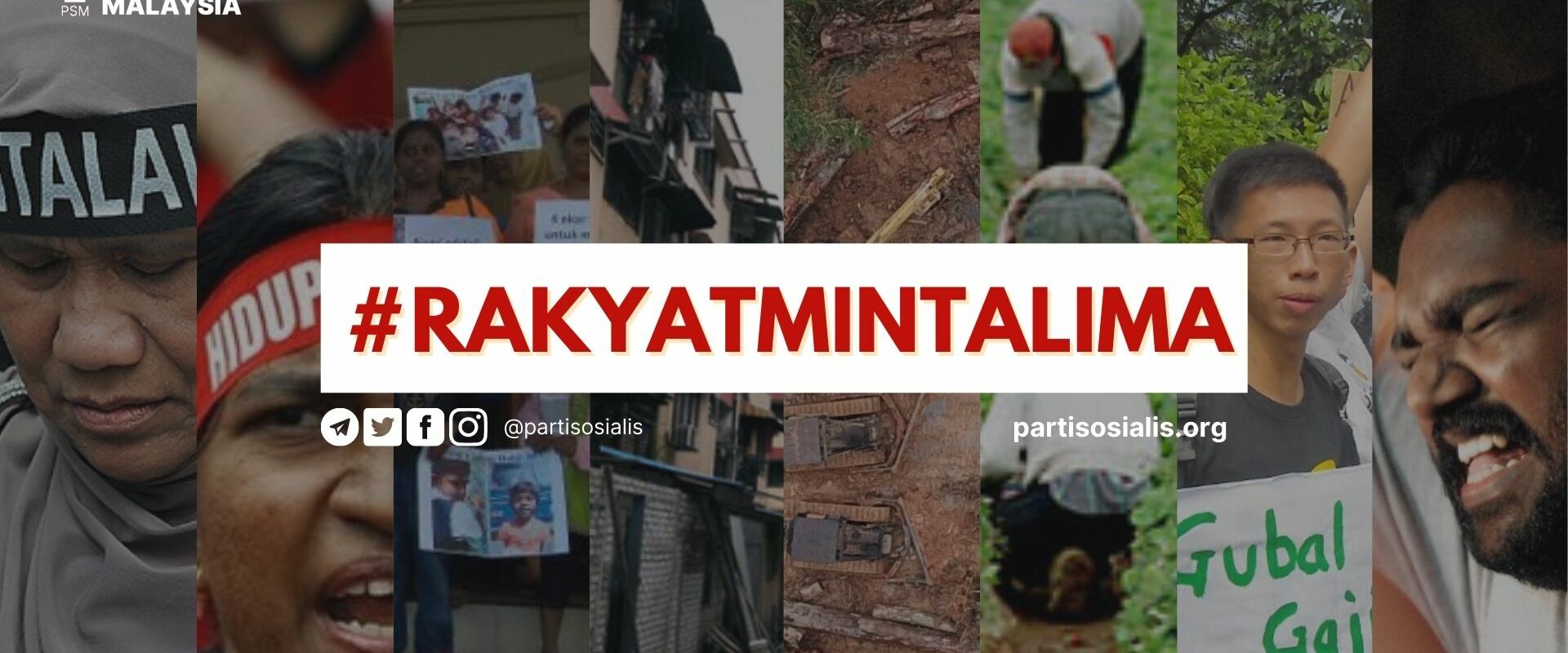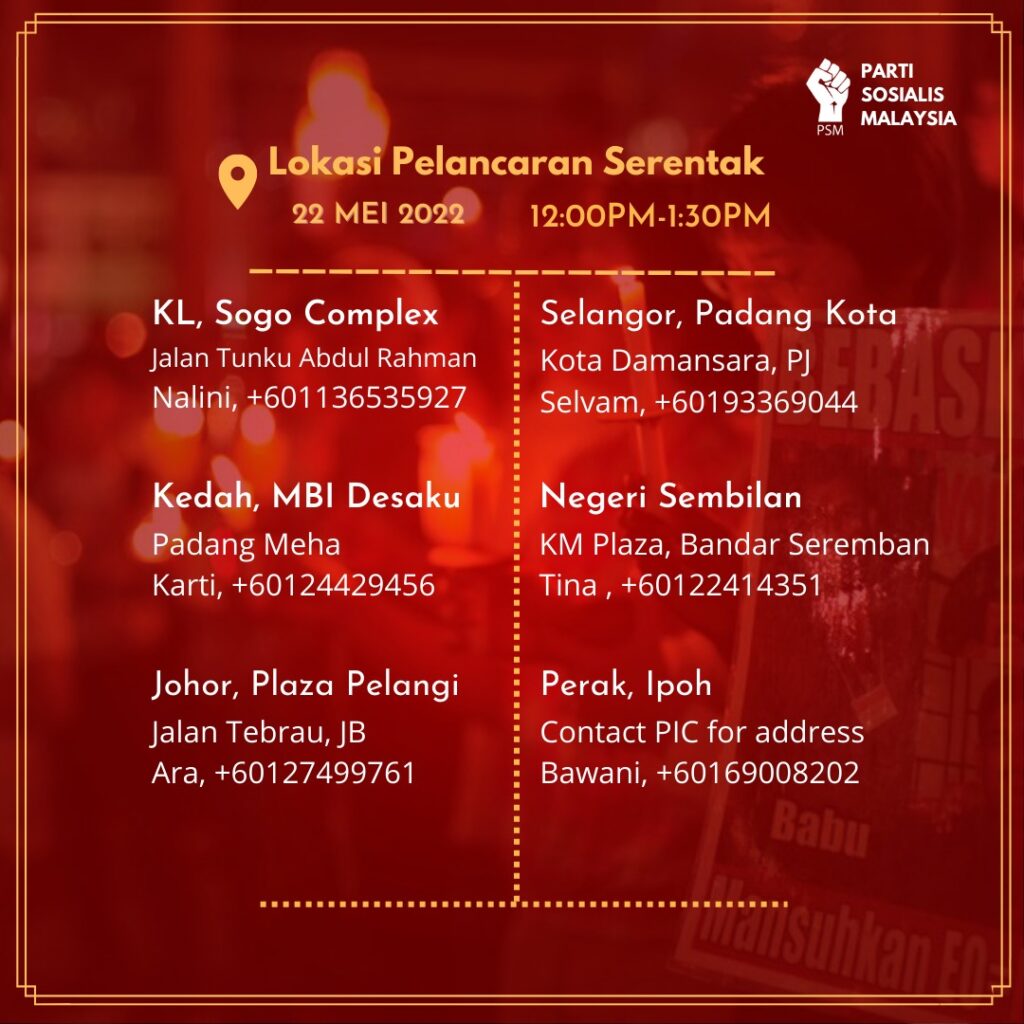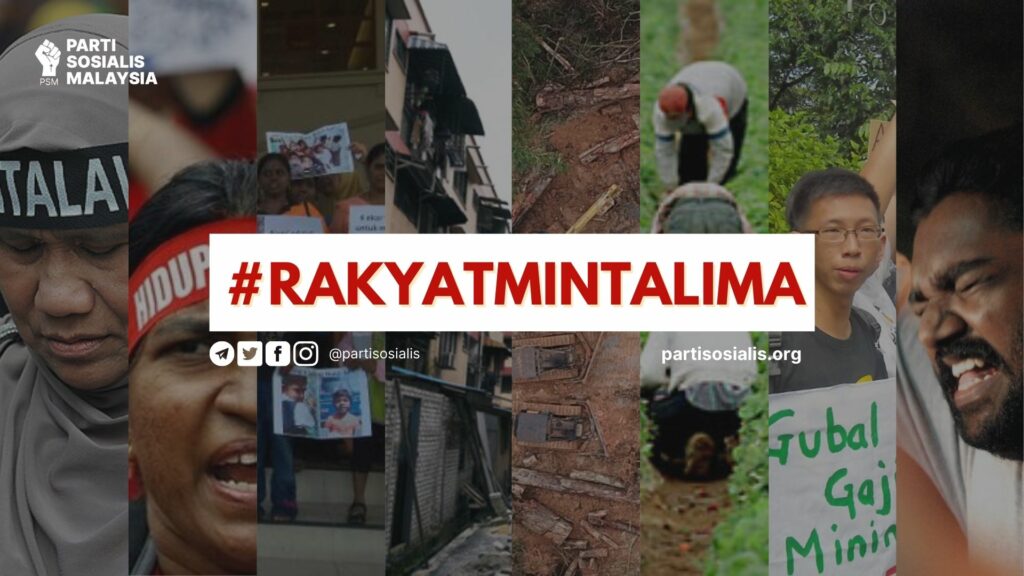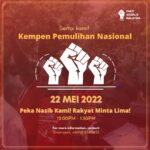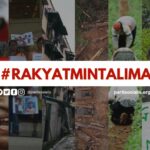Campaign
As a paradigm shift towards a progressive people centered action plan, PSM puts forward a new deal for Malaysia. The new way forward attempts to take Malaysia on a path to dismantle the adverse effects of neoliberalism by enhancing our social security and rebuilding our basic support pillars for the rakyat’s well-being. Our new deal proposals are aptly themed “Permintaan Rakyat Mudah Je” translated to mean “People’s Needs Are Straightforward”
The action plan “Pemulihan Nasional Haluan Baru Untuk Malaysia – Permintaan Rakyat Mudah Je” propounds 5 PILLARS as follows;
- Empowering Social Security
- Job Guarantee Scheme
- Housing a human right
- Reinforcing Public Healthcare
- Immediate Action to tackle Climate Crisis.
Our full document can be accessed here (Malay)
National Recovery (Malay) [PDF]
Stay tuned for updates.
Empowering Social Security for working people
- Introduce a Modified Universal Basic Income
- End outsourcing of government services and absorb contract workers as permanent government staff.
- Amend Labour and Social Security Acts to provide protection for ‘gig’ workers and precarious employment.
- Reform PERKESO’s Employment Insurance Scheme
- Monthly pensions for those above 65 years old
Job Guarantee Scheme
- Green jobs.
- Increase job opportunities in farming and food production.
- Construction and equipping healthcare facilities.
- Jobs in conservation activities, re forestation and restoration of heritage sites.
- Increase Research opportunities in medical and pharmacological activities.
- Increase social welfare workers to provide direct assistance to the needy.
- Ground officers to monitor implementation of government programs.
- Childcare work
- Socialization of housework
- Reduce working hours
- Compel Government Linked Companies to fund and initiate such job guarantee schemes
- Introduce a law against anti- discrimination in employment.
Housing a human right
- Build more PPR units for the B20
- Decouple public housing from the market
- Stop forced evictions of urban pioneers. Offer land to occupiers not third parties.
- Establish a Non- profit trust fund to build houses for the B40.
- Maintenance of low cost housing apartments to be taken over by local councils.
Strengthen Public Healthcare System
- Rope in General Practitioners to assist treating patients with chronic diseases to relieve the burden of Government Hospitals.
- Use levy collected from migrant workers to pay for their healthcare cost.
- Government should bear the cost of implants and surgical accessories at Hospitals.
- Ministry of Health budget needs to be increased.
- Quality and affordable healthcare is social wage for the rakyat.
Immediate Action to tackle Climate Crisis
- Towards 100% renewable energy.
- Address pollution from Petroleum Industries.
- Increase public transport infrastructure and ridership.
- Moratorium on logging and mining in primary reserve forest.
In the last 18 months, we have been fighting Covid 19 and the pandemic induced economic crisis that followed due to business shutdowns and movement control restrictions. As of November 2020, around 100,000 people have lost their jobs and many more in the informal sector would have lost their income.
The pandemic has exposed the failures of Capitalism the world over and Malaysia has not been spared. Although business shutdowns and movement control orders were imposed across the board to all sectors of the population, but the impact on society varies along class lines. The poor were the most badly hit. Many lost their jobs as SME’s struggled to survive and self- employed micro business had to shut down their hard built businesses when costs outran their revenue. They were forced to look for alternate source of income overnight.
Besides losing their source of livelihood, urban poor staying in 650sq feet PPR public housing found it impossible to carry out social distancing and worst still isolation if their family members were required to be quarantined.
Malaysia’s has a long standing conviction to the neoliberal path by detracting from government’s responsibility of providing for the basic essential services for the rakyat and promoting privatization of public services. After three decades of aggressive privatization, we are left with a weakened public healthcare system, monetized education, dismantled safeguards for workers, an increase in precarious work, unaffordable housing and a widening disparity between the rich and poor.
The pandemic shattered the already weak social security system, throwing poor households and even the M40 into sudden poverty. Some of the hard lessons the pandemic has thought us are;
- The Pandemic and its induced economic crisis, hits the B40 the hardest. Despite the undistinguishable attack of the virus amongst the rich and poor, but a household’s income and job security often determines if they can remain resilient throughout the pandemic.
- Jobs that were taught to be secure could just vanish overnight and many were left to fend for themselves, struggling desperately to put food on the table. Without a comprehensive social security system, many fell through the cracks.
- We were always told to believe that the private sector is the key driver for economic progress that provides jobs for the rakyat. But when economic downturn strikes, private sector faltered and downsized their workforce and froze new job openings. Many projects were put on hold, and unemployment soared to 4.8% as at June, 2021(DOSM). The impact is larger as many have been forced from formal employment into underemployment and informal work.
- Although policy makers always pushed for more privatization of healthcare, health tourism and incentives for private medical care, but it has been blatantly proven that was the public healthcare system that provided care to the rakyat under the pandemic. Private healthcare was reluctant and moved extremely slow to relieve the load off government hospitals to take in Covid patients.
- Sectors of our working people often forgotten and marginalized by many were actually the ones holding up the nation in times of crises. Those that provided essential services such as farmers, cleaners, garbage collectors, lorry drivers, delivery riders played a critical role to keep the supply and services going. We realized that it was not the fund managers, the speculators, the stock marketers and the bourgeois elite that stood out in these trying times.
These hard lessons need to be understood and, acted upon, so that we don’t make the same mistakes again. These experiences have taught us that it cannot return to business as usual and we need to seriously to revamp our economic and development model in order to make ourselves more resilient to future crises.
But the political and corporate elite whom were least affected economically and socially by the pandemic, will not be jolted to offer a progressive alternative for Malaysia. The neoliberal, corporate driven economic model of the Barisan Nasional over the last 60 over years was sadly continued by Pakatan Harapan in its 22 month stint at Putrajaya. It was merely a change of guards with minimal attempt for structural change.
PSM believes that the task of ensuring basic needs are met for the rakyat is the responsibility of government. The government cannot stop at extending easy credit to the banks and giving cash incentives to businesses to preserve and/or create jobs. But we believe that given the marked loss in aggregate demand, these stimuli will not solve the problem as elaborated above.
Trickle down approach fails to solve core structural problems in our policies. Has the political elite realized that they must step in and supply basic needs and services when the market fails to do so?
In this time of crisis, the people without income will be marginalized if we rely on market based approaches. The market fails when human need is not backed up by purchasing power. There is a real risk that a significant number of Malaysian families will not be able to provide basic needs – food, shelter and health care for themselves! And that is not acceptable!
